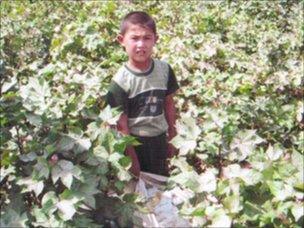Pressure on Uzbekistan to end child cotton labour
- Published

School children are reportedly being bussed to agricultural areas in Uzbekistan
Pressure is growing on the government of Uzbekistan to prove that it is ending the use of child labour during the cotton harvest.
Uzbekistan is one of the world's leading producers and exporters of cotton, a mainstay of its economy.
Human rights campaigners say hundreds of thousands of children are being forced to bring in the harvest for minimal wages and under harsh, sometimes dangerous, conditions.
As the picking season gets under way in the Central Asian country, dozens of leading international clothing companies have pledged to avoid Uzbek produce.
In the US, the organisers of New York Fashion Week recently cancelled a show by the Uzbek president's daughter, amid protests by labour rights activists.
Gulnara Karimova was forced to hire a private venue in Manhattan to unveil her new collection, with protesters gathering outside the opulent Cipriani restaurant, waving placards and chanting.
Islomiddin Dolimov, a leader of an Uzbek opposition group who took part in the protest, said: "The main reason is to show how children are forcibly being taken to the cotton fields in Uzbekistan and to say it is time to stop this."

Rights activists staged a protest outside the New York venue for Gulnara Karimova's fashion show
The Uzbek government denies that children are forced to harvest cotton and has signed up to International Labour Rights standards.
But so far it has refused to let international inspectors into the country to independently verify the progress the authorities say they have made.
'Unwavering commitment'
The BBC's Uzbek service has received reports of school children being bussed to agricultural areas in various parts of the country.
One human rights worker in Uzbekistan said she had talked to a 10-year-old girl who said her class was made to pick cotton in the mornings and attend lessons only in the afternoon.
The activist was later detained by police for questioning.
"They said, 'you have no right to be here,' and started putting pressure on us, demanding that we should sign a paper stating that we will never visit the area again," she told the BBC.
Officers confiscated her bag, papers and camera and threatened to strip her to find the memory card, she said.
More than 60 international companies have now signed a pledge to not knowingly source Uzbek cotton harvested with forced child labour.
"By signing this pledge we are showing our unwavering commitment to the cause," the Adidas group said in a statement.
Fashion group H&M said: "We will maintain this pledge until the elimination of this practice is independently verified by the International Labour Organization (ILO)."
'Can't trace'
But industry figures admit that any boycott is difficult to put into practice because companies are unable to trace the origin of cotton in their products.
Ron Parham, spokesman for Colombia Sportswear Company, says its textiles go through multiple links in a global supply chain.
"There really is no current way to trace and certify - once the textiles are in a state where we get engaged - that no cotton fibres in those textiles originally came from the cotton fields of Uzbekistan or anywhere else for that matter," Mr Parham says.
He said one way forward would be to use the model for organic cotton, where its source can be traced from final product back to the grower.
On the ground there are signs that the pressure could be starting to take affect.
A rights campaigner inside Uzbekistan told the BBC that local authorities in his region were aware of the international campaign, but had not yet received instructions as to who could take part in the harvest.